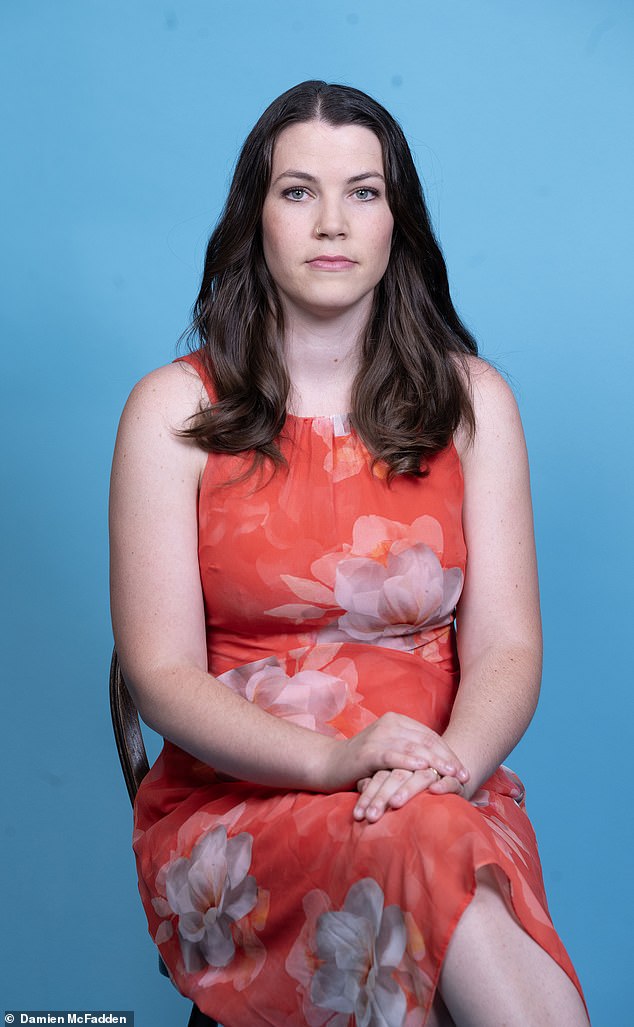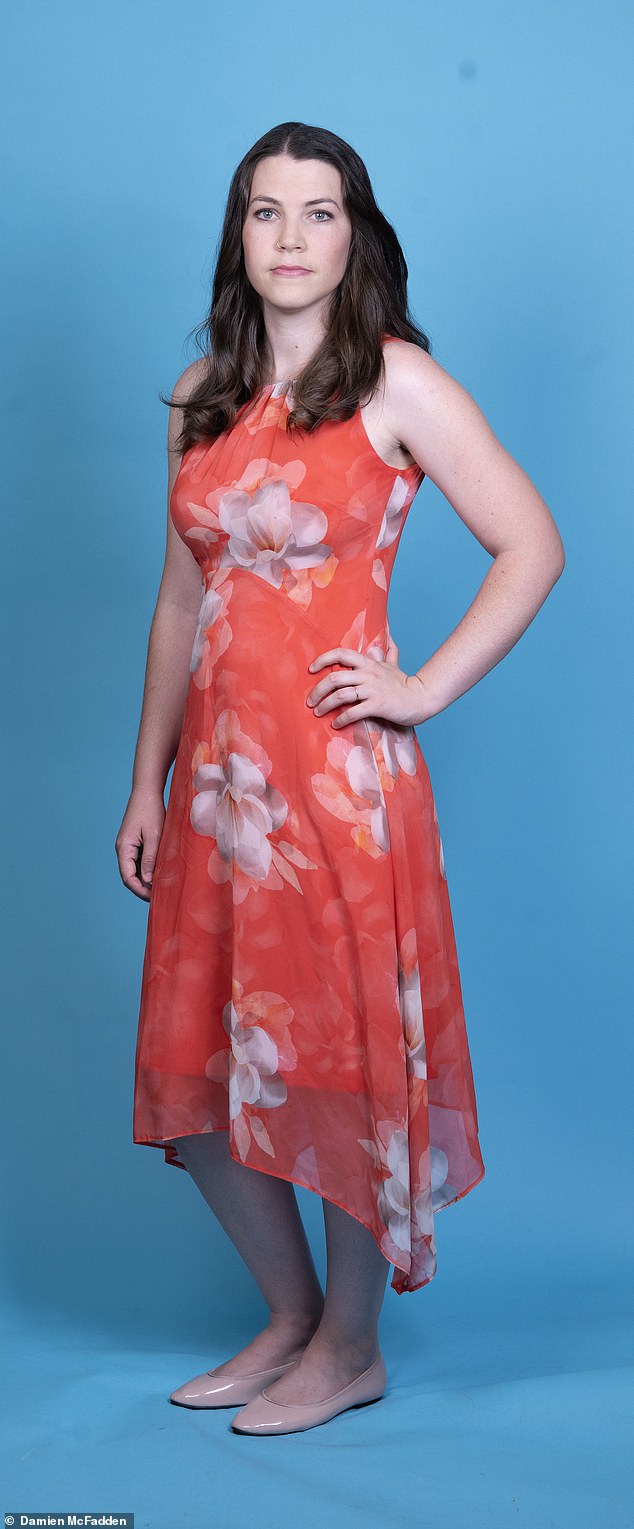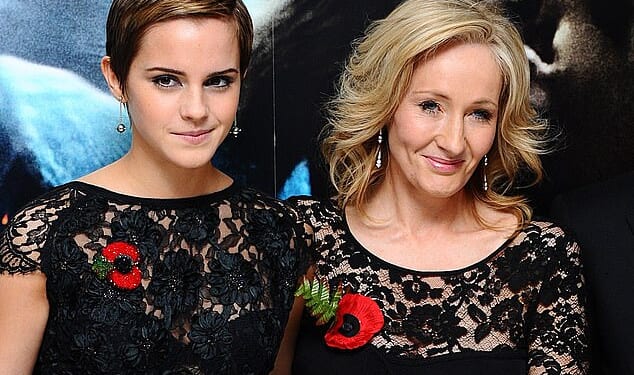Leena Khan was a 21-year-old university student when she saw the Facebook advert seeking egg donors: giving would be a selfless act, the fertility clinic said.
‘I’ve always gone out of my way to help people,’ says Leena – and with £750 expenses offered, the money would help fund her studies. As far as ideas go, she says, ‘it didn’t seem crazy’. Within months of donating, however, Leena started suffering painful, heavy periods.
She was diagnosed with endometriosis – a condition in which tissue grows outside the uterus, leading to bleeding, inflammation and scarring. By her mid-20s it was so severe she was fainting in the shower, and Leena’s mental health was in freefall.
‘I was suicidal,’ she says. Now 33, she is still crippled with pain, and awaiting her third surgery to remove endometrial tissue.
She can’t prove it, but she believes her endometriosis, an illness closely linked to levels of the hormone oestrogen, was triggered by donating eggs, which requires injecting drugs to stimulate the hormones needed to mature multiple eggs.
‘I think it’s linked,’ says Leena, a scientist from London. ‘I feel my menstrual, reproductive, sexual health has been compromised because I made a reckless decision. I was young and didn’t know better. I regret every moment.’
Recent figures reveal the number of 18 to 25-year-old women donating eggs in private fertility clinics soared by 168 per cent from 2012 to 2022.
Given fertility regulator the HFEA raised the level of expenses that can be claimed last October – from £750 to £986 – and research last month revealed births following IVF treatments, often requiring donor eggs, are increasing year on year, the number of donors is likely to rise. But at what cost to those generous women?

Maxine Farr, 31, donated eggs aged 21. Now a mother herself, she says the ordeal was more gruelling than she had anticipated
While sperm donation is a painless and relatively straightforward procedure, egg donation is invasive, requiring hormone injections to stimulate the ovaries and retrieval done under sedation with a needle puncturing the vaginal wall.
The younger the woman, of course, the better quality her eggs. Yet critics such as Helen Gibson, founder of campaign group Surrogacy Concern, say the fertility industry, worth £30billion a year, is preying on young women’s instinctive desire to please with social media adverts. On TikTok, for example, a young woman described donating eggs through the agency Apricity as a ‘meaningful experience’. On Instagram, the London Egg Bank urged women to ‘help a family fulfil their dream’.
Donors are certainly helping clinics – most owned by private equity companies – make a profit. The London Egg Bank offers six frozen eggs for sale at £5,500; The Manchester Fertility clinic a package of eight frozen eggs from £11,000.
‘The fertility industry is effectively grooming donors into thinking they’re doing something life changing and amazing – and they believe it because they’re 19,’ says Gibson.
In June, a parliamentary debate questioned whether impoverished young women are being pressured or enticed into donating eggs. Gibson is in no doubt: ‘I think these women are being exploited. What is this doing to you, your body and your brain? The truth is we don’t know.’
Indeed. The potentially fatal ovarian hyperstimulation syndrome is a confirmed risk, which the Royal College of Obstetricians & Gynaecologists says can cause mild symptoms in as many as 33 per cent of women donating eggs or undergoing IVF. Ovarian torsion (in which an ovary twists around the ligaments that support it), sepsis and abscesses are also post-surgery risks albeit rare.
But problems that materialise months or years down the line are harder to prove. There’s no clinical evidence linking endometriosis to egg donation – but there’s little research into long-term health implications of donating eggs full stop.
In 2013, the National Institute for Health and Care Excellence said information about long-term health outcomes in egg donors was ‘still awaited’. More than a decade later, we’re still waiting. I can find little mention of egg donors’ health in the last ten years of research discussed by the HFEA’s Scientific and Clinical Advances Advisory Committee.
But ‘just because there’s no evidence doesn’t mean there isn’t a connection,’ says Diane Tober, an associate professor at the University of Alabama, and author of Eggonomics: The Global Market in Human Eggs and the Donors Who Supply Them. ‘Endometriosis is something I commonly found in donors,’ she says.
Then there are the psychological ramifications of having a biological child who may or may not want to see you when they reach 18 and are legally permitted to contact you. The implications of this aren’t always felt by the very young, but may seem quite different when donors are older.
‘One donor told me ‘I feel I sold my children,’ says Tober.
Not that this is necessarily spelled out by clinics. Within minutes of filling in an online inquiry form for one well known London clinic in early 2013, Leena had a call back from a ‘very, very encouraging’ member of staff. Shortly afterwards she went for a compulsory psychological assessment which she claims focused more on how she would be helping others, not the impact on her. ‘It was mainly how it would be for the greater good,’ she recalls. When asked why she wanted to donate, she responded that it would be a ‘good’ thing to do: ‘I think my answer was very childish. I didn’t really equate it to ‘there will be a child.’
Injecting her stomach with hormones to stimulate her ovaries was ‘painful’ and initially unsuccessful – an ultrasound two days before she was due to have her eggs retrieved revealed she had already ovulated. ‘I was stimulated more than they expected,’ says Leena, who wasn’t paid anything for that attempt, and decided as she’d come this far, she should try again.
Around three months later, 12 eggs were retrieved and £750 paid the same day. ‘They didn’t want to see me after that,’ she says wryly, adding when she called the clinic with crippling stomach cramps in the following days, she was told to go to her GP.
‘Nobody wanted to come to the phone. I felt abandoned – that they had taken the thing they wanted from me.’
Leena’s once regular periods grew heavy, erratic and painful and that September, her GP suggested she had endometriosis. The following year she was referred to hospital where a laparoscopy – minor surgery – confirmed the diagnosis.
When I put Leena’s ordeal to the clinic involved, it told me it arranged follow ups with donors and encouraged them to contact the clinic with concerns. It said donors are screened for endometriosis prior to donation and ‘there is no peer-reviewed research linking egg donation to endometriosis’.
But, says Tober, ‘it’s very possible’ the extra oestrogen pumped into donors’ bodies could trigger previously asymptomatic cases.
As her 20s progressed Leena’s endometriosis moved to her bowel and bladder. ‘I bled from my rectum,’ she says. ‘I tried to kill myself three times. Even now my toilet bowl looks like a murder scene. I’m no longer sexually active because I have endometriosis on my cervix.’
Leena hasn’t asked the HFEA – as she is entitled – if any pregnancies have resulted from her donations and is ‘indifferent’ to the idea of having a biological child.
‘But things change over time,’ she says. ‘If this was the cost of what I did in a moment of insanity, I would never have done it.’
After donating her eggs three times, Rebecca Wilson developed adenomyosis – where the tissue that lines the inside of the uterus grows into the wall of the uterus, also causing heavy, painful periods. ‘My whole life became dictated around my bleeding,’ says Rebecca, 44 – to the extent that this week she’s having a hysterectomy. ‘The last years have been nothing but pain.’
When Rebecca donated in 2013, aged 33, she had two children and was about to start training as a midwife. She was driven both by a desire to help and bring in money.
An acquaintance recommended Altrui, an agency which pairs prospective donors with recipient parents and made much of the ‘lovely gift’ she would be giving, she recalls.

Maxine donated in South Africa where egg donation is anonymous, so she and the child aren’t ever allowed identifying information about each other
She was sent for a medical screening and counselling at London’s Lister Fertility Clinic where she was asked how she would feel if her biological child wanted to contact her when she was 18. ‘I said it would be interesting. I’m fascinated by genetics. I did ask how likely they thought that was.’ She was told because the law only changed in 2005 allowing donor conceived children the right to their biological parents’ identity at 18, it was too early to say, ‘but they said something about a study that indicates most people don’t want to know their donor, or if they do, it’s just out of curiosity’.
She asked if there were long-term health risks of donating. ‘I was told ‘there are no studies that indicate any kind of long-term health risks’ – which I took to mean there were none’.
While in The Lister Clinic, donating for the second time via Altrui in 2015, she was told by the clinic’s ‘egg donation co-ordinator’ a relative waiting for an egg donor at the clinic could move to the top of the waiting list if Rebecca donated her eggs direct to the clinic.
The clinic wasn’t breaking any rules by making this promise – but the HFEA’s Code of Practice stipulates clinics must treat prospective and current patients and donors fairly. It’s easy to see why Rebecca was enticed by the offer. ‘The problem was I had to go straight into another donation as I was approaching the cut-off age, 36,’ she says. So three months later she ‘started all over again’.
‘After doing those two donations back-to-back, I started getting much heavier periods, bad hormonal acne and massive mood swings,’ she says.
In 2017 her GP referred her to hospital where she was diagnosed with adenomyosis. ‘I asked a gynaecologist if she thought it could be linked to donating eggs. She said it wasn’t impossible, but it’s hard to know,’ says Rebecca. ‘I can’t be sure, but it did happen right after I took those hormones.’
Rebecca, meanwhile, was ‘bleeding basically half the month’. ‘I couldn’t look after my children the way I wanted.’ She left her job as a midwife in 2020, ‘because I couldn’t stand up I was in so much pain.’
Even after her hysterectomy, she’ll be left to grapple with the psychological repercussions of donating. Working for the NHS, Rebecca – who learned from the agency, then via the HFEA, she has two biological daughters from her donations – became involved with an egg donation charity through which she spoke to donor-conceived people. She found many don’t learn the circumstances of their conception until later in life, leading to feelings of betrayal. Some wanted to know their ‘roots’, others their medical history.
‘I didn’t think about it from their point of view. I had a sense of guilt.’ She put herself on genetic testing sites Ancestry and 23andMe so her biological daughters can find her. ‘I don’t want my DNA given to these companies, but felt it was my moral obligation.’ She has ‘serious misgivings’ about egg donation now. ‘There’s a lot of exploitation going on.’
When we approached The Lister Fertility Clinic, a spokesperson said clinics could only inform patients of risks supported by published clinical evidence: ‘We make sure all of our patients have information relating to any known risks of a procedure or treatment they are having. This is in line with requirements set out by the HFEA and their code of conduct. We hold a five out of five rating from the HFEA, reflecting our commitment to the highest standards of patient care, safety and transparency.’
Maxine Farr, a physiotherapist from Worcester, donated her eggs after giving blood at 16. ‘It was another part of my body I could donate to benefit someone else,’ she says. The idea she was creating a baby felt very ‘abstract’ then.
Living in South Africa in 2014, aged 20, she signed with agency Grace Donors, which also has a UK branch. She was required to create a profile on its website for couples to peruse, much like a dating profile. The drugs she injected to stimulate her ovaries ‘horrendously’ affected her mood: ‘I became very angry and emotional. It was very out of character.’
Eight eggs were retrieved, and she received around £230 in her bank account from the agency, no receipts required. It was 50-60 per cent of her monthly salary as a shop assistant, she recalls, and the money was ‘nice’, but she ‘probably would have done it without’.
At first, she was ‘happy’ when the agency said her eggs led to a baby boy, but as her 20s progressed, she says, ‘it dawned on me I had a child out in the world. I had no knowledge of whether they were being cared for or supported or loved.’
Now 31, married with a toddler of her own, she feels a nagging worry ‘I could have contributed to a child being in an unhappy home environment’.
Her biological child will be ten now. ‘I don’t want to spend too much time thinking about them,’ she says. ‘I’ll never be able to find anything out about them.’ On reflection, she doesn’t think younger women should be able to donate. ‘Our brains only fully develop at 25 and I don’t think we really understand the full implications. I wouldn’t say I regret it, but I wouldn’t do it again.’
- Some names have been changed





![But most doctors, myself included, filed it [turmeric] under the ¿sounds interesting, but probably doesn¿t work¿ category, writes Dr Rob Galloway](https://www.americanpolibeat.com/wp-content/uploads/2025/09/The-spice-I-take-in-a-pill-to-keep-my-350x250.jpeg)






